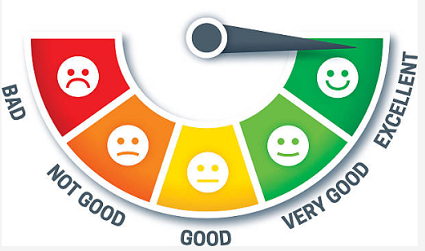Guide to Credit Score for Indians in USA

Financial systems vary in each country. However credit score is one of the most important and commonly used number/statistical measure in most countries of the world such as USA, India, Canada, United Kingdom and others.
However each country has different method to derive the score. This article is for Indians who are new to the United States or planning to move to the USA and want to learn about credit scoring in USA.
Credit Scoring in USA
When you apply for a loan, whether for a credit card, a car or a mortgage, financial institutions want to know if you will be able to repay the money and under what conditions. To do this, they check your credit score, better known as the “Score”.
The higher your score, the less risky you are for banks. That is, according to their score they decide factors such as interest rates, terms, approvals and more.
Scores are calculated based on information recorded at the credit bureaus, each factor they take into account adds points to your score ranging from 300 to 850.
On what factors, credit score is derived in USA?
In order to build it, it is important to know that your credit score is based on the following five factors:
(1) Payment History: Your payment history represents 35% of your score. This shows if you make payments on time. The higher the proportion of on-time payments, the higher your score. Every time you miss a payment, you risk losing points. Keep in mind that there are other factors that negatively affect your score such as: bankruptcies, which will remain on your credit report for 7 to 10 years, depending on the type; foreclosures; lawsuits; wage with holdings; repossessions; and judgments.
(2) Money Owed: The amount you owe on loans and credit cards is 30% of your score. This is the total amount you owe compared to the amount of credit available. When a person has used a high percentage of the total credit granted, this may indicate that he or she is over-indebted and is likely to make late or no payments.
(3) Credit Age: The age of your credit history represents 15% of your score. The older your history of timely payments, the higher your score.
Remember that, if you haven’t had credit and always use cash, they won’t be able to examine your payment method. Scores take into account how long it has been since your credit accounts opened and how long it has been since you last used them.
(4) Credit Mix: The combination of credit in use that you have makes up 10% of your score. Having a combination of installment loans, mortgage loans, and credit and store cards will increase your score. It’s worth noting that you don’t need to have one of each, and it’s not a good idea to open credit accounts that you don’t plan to use.
(5) New Credit: Recent credit activity is the last 10%. If you’ve opened a lot of accounts lately this suggests a possible financial problem and may lower your score.
Good Read: 4 ways to get credit card for the first time in USA
Benefits of having a good score
- You’ll get loans faster
- The granting decision is based solely on your credit management.
- Credit “mistakes” won’t haunt you forever.
- You’ll have more credit available.
- Lowest interest rates.
Expert Advice:
It’s a good idea to check your credit history regularly. You can get a free credit report from each of the three major credit bureaus (TransUnion, Equifax and Experian).
Trustworthy websites to get credit score for free are:
- Creditkarma.com
- Creditsesame.com
- Annualcreditreport.com
- Quizzle.com
- Nerdwallet.com
- Wallethub.com
- Bankrate.com
- Creditwise.com
All these sites partner with above credit bureaus and offer free credit report to their website users.
But you should be careful of other websites that offer free credit reports considering your data privacy. Always read the fine print, if you are thinking of buying credit report.
Author Bio:
Hi, I am Nikesh Mehta owner and writer of this site.
 I’m an analytics professional and also love writing on finance and related industry. I’ve done online course in Financial Markets and Investment Strategy from Indian School of Business.
I’m an analytics professional and also love writing on finance and related industry. I’ve done online course in Financial Markets and Investment Strategy from Indian School of Business.
I can be reached at nikeshmehta@allonmoney.com. You may also visit my LinkedIn profile.



